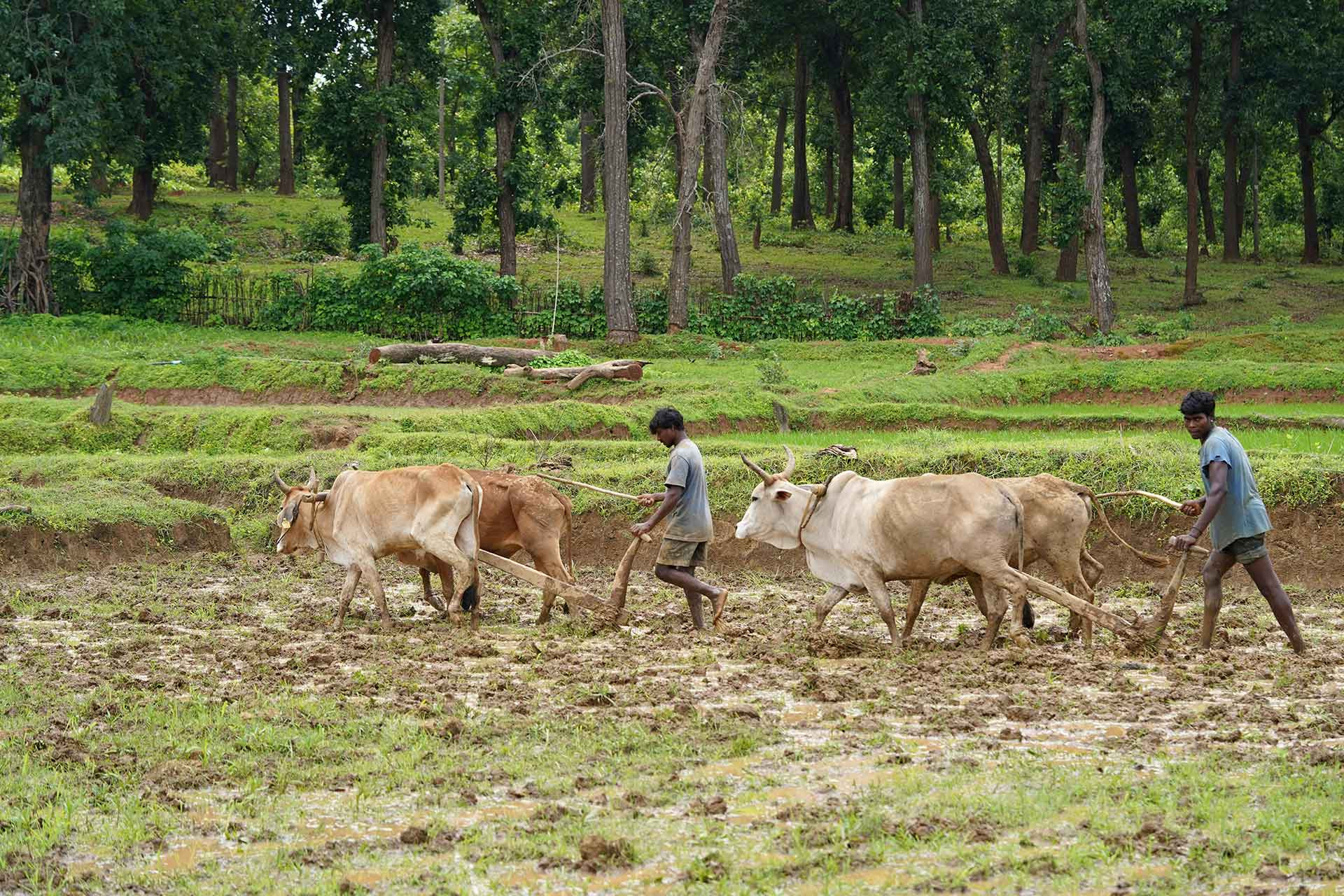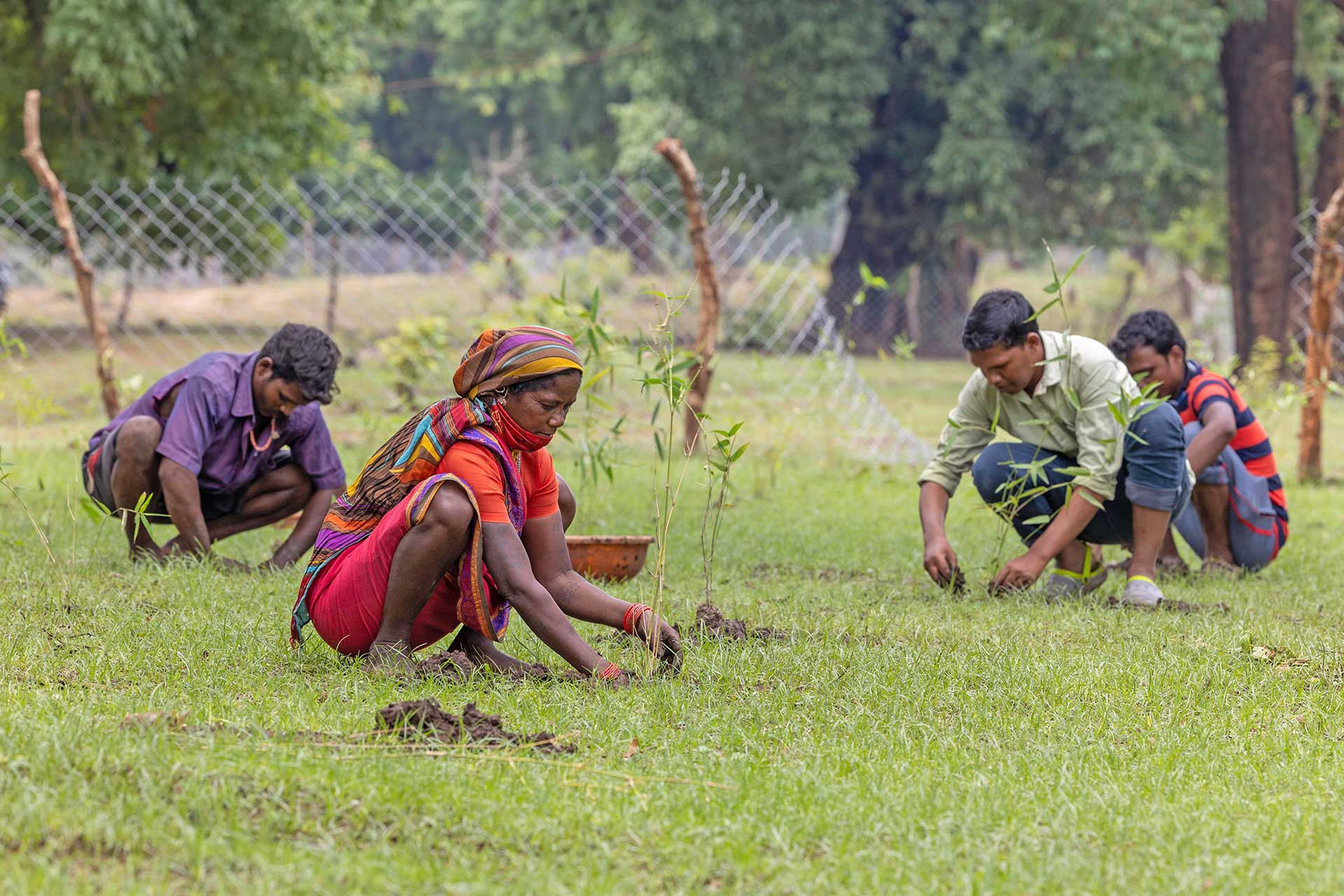It was the peak of winter. The water was icy cold against my feet as I balanced myself on the riverbed, the sun shining down, dancing on the meandering river. We were en route to the village of Chichrangpur, inhabited by members of the Baiga tribe, who were relocated here from Kanha National Park in 1975. This village in the Balaghat district of Madhya Pradesh is home to 32 Baiga families and is nestled along the Banjar river that overlooks a dense Sal forest. On our way, we met families returning from the weekly Thursday market, carrying earthen pots, warm blankets and shawls for the coming winter.
Traditionally, this indigenous forest-dwelling community never tilled the soil, but as I looked around, I realised much had changed in the Baiga landscape. Acres of barren agricultural land stretched before me, and the few trees still standing had incisions at their base, specifically made to kill, slowly but surely. New to farming, the Baiga believed that nothing would grow under the shade of a tree and that the most prestigious crop to grow was rice because it was the sign of a developed man, owing to its white colour.
Without traditional knowledge of agriculture, the Baigas were not equipped with the right tools, and it reflected in the scanty produce that marked the fields. The invasion of wild animals from across the river and their own livestock became a deterrent for those who tried to farm. Most of the villagers would migrate to Tamil Nadu or Andhra Pradesh to work through the winter and return only by mid-March, in time for Holi. Not only did this break the continuity and care needed for agriculture, but it also negatively impacted their children’s education.
Amidst this landscape, at the far end, was a patch of green covered in tall bamboo shoots. A proud fence engraved with bright pink Murga flowers marked the entrance. As I approached the plot, I was greeted by Charan Singh Baiga, the village chief, wearing an off-white lungi, a dusty blue shirt, and a turban over his head. The raised cheekbones, elongated skinny limbs and deep-set eyes were the quintessential features of a Baiga man. He welcomed me into his farm with a wide smile.
A pipe squeezed its way through the fence that separated the plot of land from the riverside and was watering hundreds of bamboo plants. Some were smaller, newly planted, and close to the wired fence, destined to replace it once disintegrated. Across the bamboo shoots was a greenhouse filled with a bounty of vegetables (growing in sacks). There were over 20 varieties of crops that were fruiting and flowering. Charan Singh plucked a few pods of tuar (Pigeon Pea) and handed it to me to peel. As we moved outside and walked along the river, he told me the story of a friendship that had led to this transformation.
Charan Singh took a huge leap of faith last year by trusting a city man named Vipul Gupta against the wishes of the entire village. Most of the villagers feared men from towns and cities, as the last time they came, they took away their land and access to the forest and moved them here without any resources to survive. It had taken months of conversations, attending weddings and funerals, and breaking bread together, which led to the trust and friendship between the two.
Vipul Gupta is the founder of Earth Focus Foundation, an NGO that works on conservation, education and livelihood in the Kanha region. The Earth Focus team started their pilot land restoration project on one acre of Charan Singh’s barren land in 2020. They provided Charan Singh with a fence, water pump and pipes, while saplings and seeds of bamboo, vegetables, pulses and fruiting trees were arranged through government schemes.
As the farm grew, so did Charan Singh’s neighbour Son Singh’s curiosity, who also approached Earth Focus to start work on his barren land. Following him, 17 farmers contributed 36 acres of land and joined hands with Earth Focus to be a part of their land restoration programme, which intends to diversify and enhance community members’ income streams while rejuvenating the local ecosystem. Having reintroduced species of flora that have cultural, economic, medicinal and nutritional value, the team has restored acres of degraded land with 8,000+ saplings of varied fruiting and native trees based on the community’s needs. This agriculture-horticulture-forestry model supports Baiga families with food and brings in additional income due to the seasonal cycle of the harvest.
The success story of Chichrangpur village has inspired the Earth Focus team to undertake the next 100-acre project that has come up in the neighbouring Mukki village. The team is actively seeking funds for procuring organic seeds, pumps, pipes, green sheds, and sacks. Vipul Gupta firmly believes that philanthropy is not for the rich, nor is it for later, it is for everyone and must be done every day.
You can donate to the Earth Focus Foundation, here.








